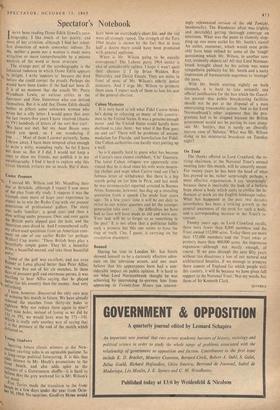Banned
During his visit to London Mr. Tan Smith showed himself to be a curiously effective advo- cate on the television screen, and one must believe that his appearances have had a con- siderable impact on public opinion. It is hard to see what Lord Normanbrook thought he was achieving by intervening to •prevent him from appearing in Twenty-four Hours (an interest- ingly rejuvenated version of the old Tonight, incidentally). The Rhodesian affair was (rightly and inevitably) getting thorough coverage on television. What was the point in clumsily stop- ping up one more outlet for Mr. Smith's views? An outlet, moreover, which would most prob- ably have been refined by some of the `tough' questioning which Mr. Wilson, in another con- text, evidently objects to? All that Lord Norman- brook brought about by his action was some sympathetic publicity for Mr. Smith and a nasty impressiori of bureaucratic eagerness to `manage' the news.
With Mr. Smith starring nightly on both channels, it is hard to take seriously one official justification for the ban which the Guard- ian quoted—that public broadcasting facilities should not be put at the disposal of a man entertaining treasonable action. And as for Lord Normanbrook's other argument that the pro- gramme had to be stopped because the British government would not be putting its case along- side Mr. Smith's, that is surely an absurdly narrow view of 'balance.' What was Mr. Wilson doing in his ministerial broadcast on Tuesday night?






































 Previous page
Previous page